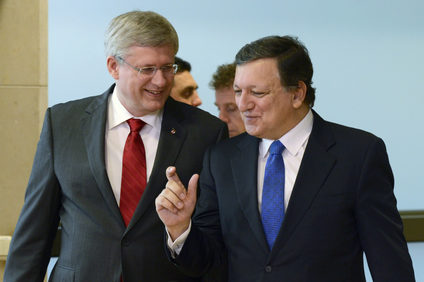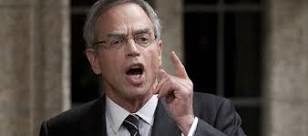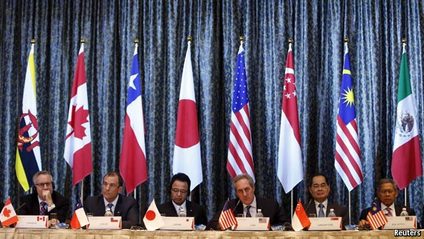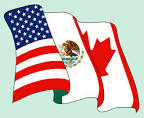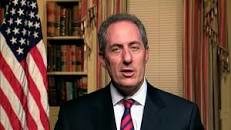Public Citizen's Eyes on Trade Blog. Feb 19, 2014. U.S.
Untangling the Trade Talks: What are the likely consequences of an EU-US trade deal for our food and environment?
Posted on March 7, 2014Hosted by 'Friends of the Earth Europe' alongside 'Transnational Institute', 'Institute for Agriculture Trade Policy' and 'Seattle to Brussels Network'
The Press Club Brussels Start: Thursday, Mar 13 2014 1:30 PM End: Thursday, Mar 13 2014 6:00 PM
To register, please visit
Canada should follow EU lead on investment rules
Posted on March 7, 2014, , Published: Monday, 03/03/2014
What has become of the Canada-European Union free trade deal? The Harper government announced an “agreement in principle” with the EU in late October. And yet talks continue in a number of areas, notably on a controversial NAFTA-like investment protection chapter that is giving Europeans second thoughts.
Canada has no plans to further ease uranium investment rules - M inister
Posted on March 7, 2014Feb 27 (Reuters) - Canada has no plans to further ease rules for foreign investment in uranium mines after Ottawa moved to give European Union firms more leeway, a senior official said on Thursday.
As part of a Canada-European Union free trade deal that was announced in principle last year, Ottawa waived a longstanding requirement that EU buyers take on a Canadian partner in uranium mines.
Natural Resources Minister Joe Oliver said Canada did not intend to make the same offer to non-European companies such as Australia's Rio Tinto Ltd, which has uranium deposits in northern Saskatchewan.
"There are no current plans to do that," he told reporters, saying the easing of rules for European firms was a major step.
The Trans-Pacific Partnership No end in sight
Posted on March 7, 2014Feb 25th 2014, The Economist
THE trade agreement the 12 members of the Trans-Pacific Partnership (TPP) hope to reach is to be “ambitious”, “comprehensive”, “high-standard” and “21st-century”. I know this, because every one of the 12 trade ministers who spoke at a press conference at the end of four days of talks in Singapore on February 25th, used at least one, and usually all four, of the terms. The talks had made great progress, they all also agreed. But “significant gaps” remain, no date or place has been chosen for their next meeting, and it was hard to avoid the conclusion that any agreement is months or years away.
TTIP ‘challenged’ by environmental critics, EU says
Posted on March 7, 2014EXCLUSIVE / Plans for a sweeping EU-US free trade deal known as TTIP risk being blown off course by civil society fears about the damage it could wreak on environmental and social protections, according to a leaked EU document seen by EurActiv.
The preparation paper for an EU-US Summit on 26 March, which is marked as ‘restricted’, identifies the Trans-Atlantic Trade and Investment Protocol (TTIP) as a “clear vector for jobs and growth for both the EU and US”.
But it warns that “stakes are high” in the race to thrash out a deal, with “challenges on both sides of the Atlantic that need to be managed.”
A trade agreement nobody should want
Posted on March 7, 2014by Serge Halimi
You can safely bet that the (TPA) will not feature as much in the forthcoming European elections as the extradition of illegal immigrants or the (alleged) teaching of "gender theory" in French schools. The TPA will affect 800 million affluent people and almost half the world's wealth (1). The European Commission is negotiating this free trade agreement with Washington on behalf of the EU's 28 member states, and the European parliament elected this May will be expected to ratify it. Nothing is settled as yet, but on 11 February the French president François Hollande, during his state visit to Washington, proposed to speed things up, saying: "We have everything to gain by moving quickly. Otherwise, as we know all too well, there will be a build-up of fears, threats and tensions."
TPP Talks Fizzle Again under Broad Opposition
Posted on March 7, 2014Posted: 25 Feb 2014 06:53 AM PST
Another high-level Trans-Pacific Partnership (TPP) meeting has fizzled with no deal. The talks have missed a
succession of deadlines due to opposition from negotiating countries to corporate-backed U.S. demands that would
increase the cost of medicines, restrict financial stability measures, and empower corporations to challenge health
and environmental safeguards. Back at home, the administration's attempt to Fast Track the TPP through Congress
suffers from overwhelming congressional and public opposition.
Facing international and domestic resistance, and having already missed deadlines to seal a deal last October and
December, TPP trade ministers refrained from naming another deadline after finishing negotiations in Singapore
today, stating only that they hope for a deal "as soon as possible."
CETA “not about trade”
Posted on February 20, 2014By: Marilyn Reid | February 17, 2014. Newfoundland and Labrador, The Independent
In the first of this 5-part series: What the North American Free Trade Agreement has taught us, and the implications of another treaty based on the neoliberal “free trade” ideology
The Next Phase of North American Integration. NAFTA to be Swallowed up by the Trans-Pacific Partnership (TPP)?
Posted on February 20, 2014by Dana Gabriel, January 28, 2014 In preparation for the upcoming North American Leaders Summit which will be held in Toluca, Mexico on February 19, U.S. Secretary of State John Kerry recently held a meeting with his Canadian and Mexican counterparts. Over the last number of years, not as much attention has been given to the trilateral relationship. Instead, the U.S. has essentially pursued a dual-bilateral approach with both Canada and Mexico on key issues including border and continental perimeter security, as well as regulatory and energy cooperation. On the heels of its 20th anniversary, there once again appears to be renewed interest in broadening and deepening the NAFTA partnership as part of the next phase of North American integration.



